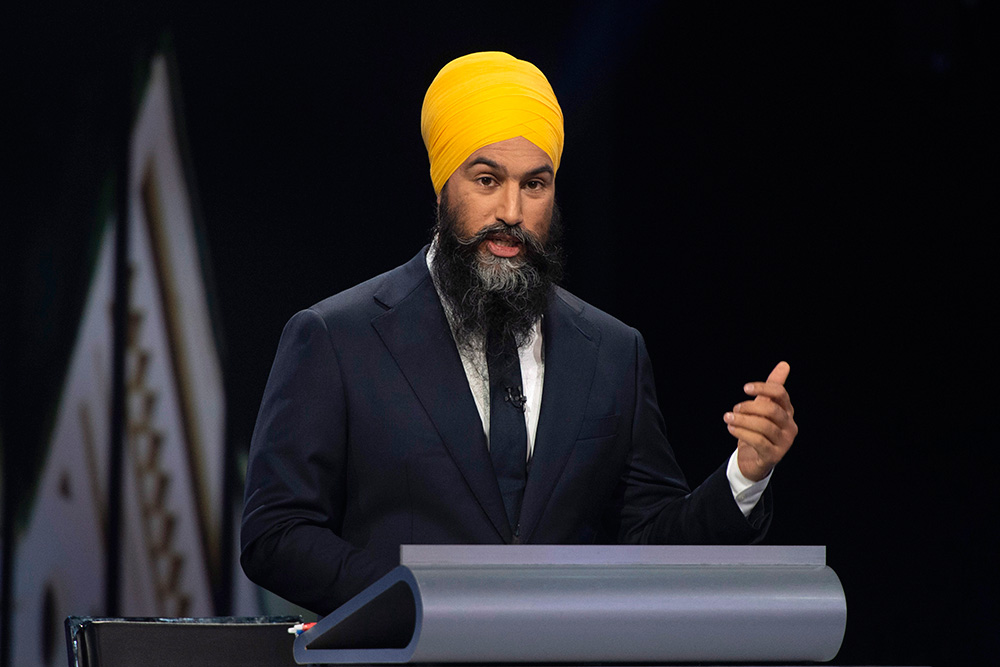A wealth tax wouldn’t just bring in revenue. It would curb the out-of-control political power of the one per cent.
 The NDP under leader Jagmeet Singh promises to implement a one-per-cent tax on wealth over $20 million. It’s an idea whose time has come. Photo by Sean Kilpatrick, the Canadian Press.
The NDP under leader Jagmeet Singh promises to implement a one-per-cent tax on wealth over $20 million. It’s an idea whose time has come. Photo by Sean Kilpatrick, the Canadian Press.
Canadians can be smug when it comes to comparing our political debate to politics in the United States. But we’re way behind our American neighbours when it comes to fair taxes on the accumulated wealth of the billionaire class.
Here, we’re still hearing the same tired arguments against a wealth tax.
But in the U.S., the debate now includes a serious discussion of how much we should tax wealth. Bernie Sanders and Elizabeth Warren, two contenders for the Democratic presidential nomination, both back a wealth tax but debate how high it should be.
Sanders has set out the foundation for his version of the tax bluntly. “Billionaires should not exist,” he’s stated. That’s not an attack on the individuals, but a statement that a relatively few people should not control so much of society’s shared resources.
And he’s right. Nobody “earns” a billion dollars. Such sums are only redistributed from the collective effort of many into the hands of the few.
Taxing the wealth of billionaires and the rest of the one per cent increases government revenue for programs or services for everyone.
More importantly, it decreases the ability of the wealthy to shape and control our political, social and economic life. The wealthy bankroll political campaigns and fund an entire infrastructure of media, lobbyists and think tanks to further a simple agenda — maintaining their disproportionate privileges. A wealth tax is about redistributing power as much as it is about redistributing wealth. It’s about restoring democracy.
And it’s sound economic policy. Gabriel Zucman and Emmanuel Saez, two of the world’s top scholars of inequality, have dedicated much time to assembling the wonky details that demonstrate the benefits of a wealth tax. Among other important voices, the two UC Berkeley economists have shown how a wealth tax could be practically implemented to tackle inequality, addressing issues like the challenge of assessing wealth and minimizing evasion.
The conversation about the wealth tax in the U.S. should help clarify the discussion here. The research and analysis have debunked the common arguments against taxing wealth.
Some argue the wealth tax is self-defeating: the wealthy will hide their wealth or simply flee.
But the wealthy, while mobile, are also human and hold many personal connections to place that can be more powerful than their desire to pay less in taxes.
More importantly, while it may be relatively simple for a wealthy person to move, it’s not that easy for many forms of wealth to move or disappear. They are not hiding money under the mattress. Factories, offices, land and other physical things that constitute wealth largely stay in place, even when ownership changes or moves. They will still be useful and productive.
Another common argument against taxing wealth is that it’s too hard or costly to figure out how much wealth a person has. This objection ignores two important facts about wealth today.
First, many of the assets held by the ultra-rich are financial. Stocks, mutual funds, bonds and the like have well-defined value. Anyone can look up the price of a stock or bond. Forbes has a made science of calculating the wealth of the richest Americans. If a magazine can do it, so can governments.
And second, both the U.S. and Canada already have taxes on wealth, just not taxes on all wealth. Property taxes on real estate exist in most jurisdictions. They are levied based on detailed annual assessments; the same could be done for other forms of wealth.
Together, property tax assessments and financial markets would allow governments to assess the value of financial holdings and real estate, which together account for most wealth.
Zucman points out that the trouble of creating annual assessments is actually an argument in favour of regularly taxing wealth. Once the process is in place, it produces increasingly accurate results that can be used to better tax estates and help with public administration. SOURCE
